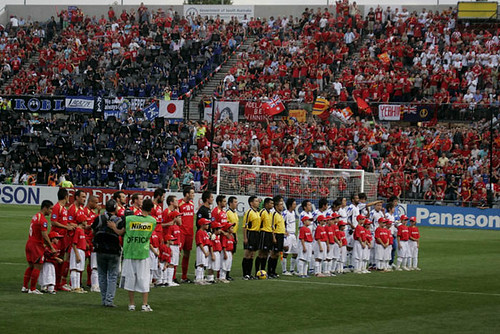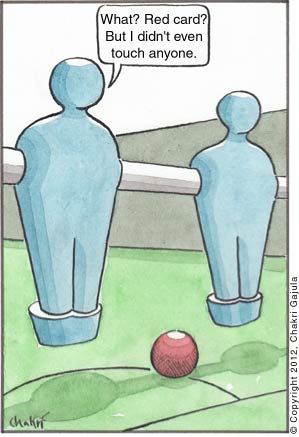Man City Over 35s wrote:johnydep wrote:Man City Over 35s wrote:
Lots of leagues in the UK are doing tables for U8 upwards.
Thought that there is an issue in the UK with the poor development of junior players, the lack of choice for the National team and the amount of talent being brought in from overseas to fill the gaps.
Wonder why?
No issue with development in UK.That's media driven bullsht The National team perform poorly because of bad management. Not only that all nations have improved.
The other 3 divisions in the football league have become stronger than they ever used to be. Crowds are up, as well as wages.
Non-league clubs are the same. More & more non league clubs have youth academies, something they never dreamed of 10 years ago. Better facilities.
Just because Chelsea & Man U don't want Crawley's striker doesn't mean he has not developed.
Hearing lots different..this just one example:
Youth Development: Making a Splash
Neil Billingham
FourFourTwo - September, 2007
To see what the best of English youth football has to offer, FourFourTwo went along to the final of this year’s FA Youth Cup between Liverpool and Manchester United at Old Trafford. Half an hour before kick-off, and Sir Matt Busby Way is almost as busy as it is before a Premiership or Champions League fixture: evidence, if it were needed, of the massive interest in youth football on these shores.
Inside the stadium, most of the lower tier is full, and later on the official attendance is announced as 28,000. But whether it’s the expectant crowd, the nerves of playing in a final, or the edginess of a big North West derby, the football on offer leaves a lot to be desired. United’s number 10, Chris Fagan from Dublin, looks very promising. The striker has got pace and passion and regularly drops deep like Wayne Rooney, causing Liverpool numerous problems.
But in terms of poise, touch and class, only one player really stands out above the rest – Liverpool’s number eight. His name? Astrit Ajdarevic. He’s not English of course, but a Swedish junior international. It’s depressing for English football to think that of all the players on show, maybe the two with the best chance of making their first teams are Irish and Swedish.
After being 2-1 down from the first leg at Anfield, Liverpool score the only goal of the night at Old Trafford, making it 2-2 on aggregate, forcing a penalty shoot-out which the Merseysiders win 4-3. It’s Liverpool’s second successive FA Youth Cup triumph, and for their coach Steve Heighway, his last match as head of the club’s academy. He’s stepping down from the job after 19 years in which he groomed a host of players including Robbie Fowler, Steve McManaman, Michael Owen and Steven Gerrard. Heighway’s reasons for leaving become clear a week later when he lashes out at Liverpool boss Rafael Benitez in an article in The Times.
“In my view, I’m the best coach of 17 and 18-year-old players at this club,” he said. “But I no longer get the chance to do that. That’s crazy, that’s mad. It’s to the detriment of the young players at this club.”
Heighway’s main bone of contention is Benitez’s view that some of the youth players should leave the academy and join Liverpool’s reserve team, but Heighway believes reserve teams are a waste of time and that his best players should either stay with him at the academy or go into the first team, as Michael Owen famously did. The former Liverpool winger also urged football to engage in a serious debate about the damage being done to young players because of “outdated reserve football”. There needs to be a debate about a whole lot more than that.
Many of the people FourFourTwo has spoken to in the past month have talked at length about the numerous problems in youth football and have offered plenty of solutions – some obvious, some radical. But who is listening? Many of them are putting their faith in Richard Lewis’s review of young player development, hoping that something concrete will come from it. It won’t. The review has been conducted by the FA, The Premier League and the Football League and is intended to examine the framework and funding for young player development. But ask Sir Trevor Brooking about the review, and you can see why there’s little reason for optimism.
“In early 2006, we [the FA] asked the Premier League and the Football League if we could revamp youth development,” says Brooking with frustration. “They said no. We finally agreed to commission a review, between the three of us, but it was decided that it wasn’t going to be a football person who would do it.”
Richard Lewis is chief executive of Rugby Football League. It’s thought that Brooking wanted a football figure like Graham Taylor or David Pleat to head the review, but the Premier League and Football League were concerned the findings might not be in their best interests. Therein lies a fundamental flaw in how English football is governed. “We’ve got governing bodies like the Premier League who are regulating themselves,” says Brooking, who admits he has no idea what, if anything, will come of the Richard Lewis review. “Nowhere else would this be acceptable, but instead we have a situation where the football leagues are often working against the governing body. I’d like the FA to have more control of youth development, but it isn’t easy.”
Brooking is at least trying to have a positive affect, particularly in the five to 11 age group, an area largely ignored before 1997. The FA has just appointed two national and nine regional coaches in this age group, while a further 66 skills coaches for five to 11s are also now working in 12 counties. Brooking believes this age group shouldn’t just be playing football, and must be offered multi-skill, multi-sport programs at schools and clubs. Otherwise, many youngsters won’t have the co-ordination to make it as professional footballers. Indeed, a Department of Education study found that 60 percent of 11-year-olds are physically illiterate; they simply don’t possess the ABC of physical movement: agility, balance and co-ordination.
“English players aren’t good enough,” laments Brooking. “Look at the Premiership: only 40 percent of the starting line-ups are genuine home-grown players. In Italy, it’s 70 percent. People say the new UEFA regulations on home-grown players will help, but they won’t. The UEFA quotas can all be filled with foreign players. I can see a situation where all our academies are packed with future World Cup winners… but none of them will be English.”
While countries like Holland, France and Spain implement their well thought out, meticulously planned youth schemes, English football is still talking about what to do. Riddled with conflicting interests, contradictions and problems, youth development seems to be going in circles.
The professional clubs are unwilling to have their academies audited, so standards vary and quality control is non-existent. The Premier League is even more unwilling to spread its enormous wealth down to the grass roots. The game’s governing body appears toothless and incompetent.
“There’s no leadership in this country,” says Simon Clifford. “Who’s in charge? Is it the Premier League? The Football League? The Football Association? Nobody knows, so nothing gets done. I just do my own thing. We’ve achieved an awful at Futebol de Salao, and we’ve done it all without a Football Foundation grant or any assistance from the FA”. Clifford also has Socatots, a football-specific play program for children from six months to five years old. He’s a busy man.
“I just get on with it” says Clifford. “Everybody else just seems to talk about youth development. But will we still be talking about it in four or eight years time? Because if we are, I honestly think England will be struggling to qualify for major tournaments by then.”
As alarming as that may sound, it’s a view which is shared by many in the game today. From radicals like Simon Clifford, to establishment figures such as Sir Trevor Brooking, to experts in youth development like Dave Parnaby, they all believe that if something isn’t done soon, English football and consequently the national team will pay a very heavy price. Could the last English player to leave the dressing room please turn out the lights?












